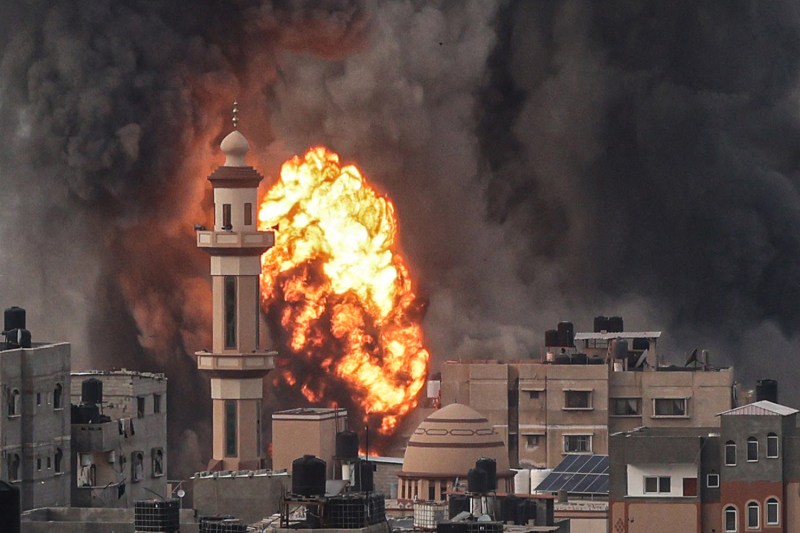Why Is the World Seeing More Conflicts Than Usual?
Comfort Ero explains why leaders seem more inclined toward war than dialogue.
2024 is off to a glum start, with wars raging on multiple continents and little hope for diplomatic breakthroughs. Every January in Foreign Policy, the International Crisis Group’s Comfort Ero and Richard Atwood list out 10 conflicts to watch in the year ahead. Their list includes Ukraine, Gaza, a wider Middle East war, and Sudan, of course, but it also details tensions in Ethiopia, the Sahel, Myanmar, Haiti, Armenia-Azerbaijan, and the possibility of conflict between the United States and China.
2024 is off to a glum start, with wars raging on multiple continents and little hope for diplomatic breakthroughs. Every January in Foreign Policy, the International Crisis Group’s Comfort Ero and Richard Atwood list out 10 conflicts to watch in the year ahead. Their list includes Ukraine, Gaza, a wider Middle East war, and Sudan, of course, but it also details tensions in Ethiopia, the Sahel, Myanmar, Haiti, Armenia-Azerbaijan, and the possibility of conflict between the United States and China.
Is the world confronting more conflicts than usual? If so, then why? And what can be done about it?
The International Crisis Group is an independent organization that speaks to all sides in conflicts and seeks diplomatic avenues to solve them. I spoke with the group’s president and CEO, Comfort Ero, on FP Live. Subscribers can watch the full interview on the video box atop this page. What follows is a condensed and edited transcript.
Ravi Agrawal: I thought I’d start with the big picture. You’ve been doing this for a while. Are we in a period of more conflict than usual right now, or does it just feel that way?
Comfort Ero: What is quite telling about this period is that it’s really spread across the world. In every region the Crisis Group works, we are dealing with a live conflict or criminal gang issues. Statistically, it feels worse as well. There’s a sense that war is on the rise, and it is complicated by the lack of leadership we highlight in the essay.
RA: But why? Why are we in a period of more conflict right now?
CE: When you’re trying to figure out why things appear to be falling apart, there’s a sense in which this is colliding with great-power competition; it’s colliding with a loss of faith in institutions; the lack of collaboration over COVID-19 and the way in which a number of countries were left to fend for themselves in responding to vaccine distribution; and it all comes at a time when leaders are creating different alliances, no longer believing in the values that bind the international community.
At the same time, there are more actors in a multipolar world, and this emergence of middle powers who recognize that some of the major powers, particularly the United States, is unpredictable, not necessarily reliable in the same way, and has lost some of its edge.
What’s worrying is that it’s all colliding at the same time. There’s a sense in which this is a year of living and waiting dangerously for when the next big crisis is going to emerge.
RA: There’s another layer to this “year of living dangerously,” as you put it, and that’s the flux that might come from a year of elections around the world, as we describe in our latest print issue.
One of the themes in your essay is how leaders are taking matters into their own hands more than usual—using military might rather than diplomatic options. And that plays into what you’re describing, of a global system characterized by less trust.
CE: Exactly. A classic case of that is Armenia and Azerbaijan. I was there last month and saw just how brutal and how much of a knife’s edge that country was on in the week in which world leaders were meeting at the United Nations General Assembly. It’s in that week that Azerbaijan, in a sense, finished the job of reclaiming Nagorno-Karabakh. The Security Council itself was silent. And when you look at it from Baku’s perspective, they see that the one restraining power, Russia, is itself embattled. It’s caught up in Ukraine. So Baku feels emboldened.
And then you look at Ethiopia. What emerged out of Tigray, for example, was a sense of a victor’s peace, where Prime Minister Abiy [Ahmed] felt emboldened by securing victory and could bring in a more militarized approach to handling that situation. And as we speak, we’ve got the same situation in Sudan. Neither side sees any restraint. They see nobody. None of the mediators, none of the usual actors who have often played a heavy role in this particular crisis, have any leverage. That is the context in which we’re talking. And that is the context in which we see a rise of war and a rise of militarism to solve conflicts.
RA: Let’s go a bit deeper on the topic of Sudan, which doesn’t get as much global coverage as Ukraine or Gaza. What’s going on there?
CE: The country has experienced nine months of war—although it didn’t start nine months ago. A lot of us were involved back in 2019, at a time of heightened expectations and revolutionary fervor after the ousting of Omar al-Bashir, the long-term leader there. He had been in power for over 30 years, and suddenly there was a popular uprising, and with that a lot of hype and expectation that we were going to see a turn of the page and a real transformation after years of kleptocracy and corruption, and also after the specter of genocide that was taking place. You remember the efforts around Darfur. All those things that we’d fought for the last 20 years to try to get resolution, try to piece the country back together again—the violence, sense of collapse, death, displacement, children out of school—all of that is coming back now in the midst of a contest between two military factions, the army and the paramilitary Rapid Support Forces (RSF), fighting for the heart and soul of Khartoum.
Why are these factions fighting? It’s about the security sector, which is about power, which is about control, which is about access to money. None of these facts have changed. And whoever wins stands to preside over a lot of resources; whoever loses, their fate becomes quite dangerous.
One of the challenges in resolving Sudan today is that outside actors have a different notion and understanding of the Sudan that they want and the stability that they want to see in Sudan, and this has allowed a mushrooming of the conflict.
RA: Just to linger on that for a moment, the United Arab Emirates might be supplying the RSF with weapons, while the army is backed by Egypt. Amid all of this, the United States removed its staff from the region. How does all of this play out, and is it your sense then that Washington has abandoned Sudan? Should it be playing a bigger role?
CE: The key players that were always pivotal or crucial to helping to nudge a crisis in the right direction are missing from the table. The United States is a perfect example in Sudan. Historically, it often had a strong envoy, played a significant role in a lot of shuttle diplomacy, did heavy lifting in the region, working in concert with the region, trying to cajole and pull all the forces together. That is missing.
But there are other relevant actors to the Sudan story: The African Union, Kenya, Ethiopia. They’re also competing and at loggerheads in terms of the direction in which Sudan should take. At the start of this new round of crisis, there was emergency diplomacy taking place in Jeddah in which Saudi Arabia and Washington were involved. But they parted company, with neither side necessarily happy with what is happening. There is also the fact that other key actors were not engaged in the process, which complicated the ability to make sure that effort stuck. We managed to get some bargains—humanitarian pauses and things like that. But none of that is sticking.
Right now—fast-forward—we had an important initiative taking place before the end of last year in Djibouti, led by the regional actors. Both sides made a commitment toward an unconditional cessation of hostilities. Both sides said they would talk, but getting them to talk, getting various actors to get them to talk, is the problem that we have right now.
RA: Let’s jump to Ethiopia. Things were looking a bit more hopeful at the start of 2023. Not anymore. What’s going on?
CE: We say things were looking better in 2023 because we were all focused on Tigray. One of the consequences of the Tigray conflict was the relationship between Abiy and the militias from the Amhara region. They were fighting with the federal forces to put down the Tigray rebellion. As a result of the peace agreement between the Tigrayans and the Ethiopians, the Amharas felt left out. They felt hemmed in as a result of the deal that Abiy struck with the Tigrayans. They felt as though Abiy had turned against them, not dealing with their own territorial disputes that they have with the Tigrayans, and feeling as though he made too many compromises, leaving them in a very vulnerable position.
There’s another contest taking place with Abiy’s people, the Oromos, for the direction and leadership of Ethiopia. It’s about who sits at the helm of that. Both the Amhara people and Oromo people want a seat at the table. There is a contest for power and leadership, and these long disputes, some of them are territorial, some of them about power, and some of them about the fate of the country. They’re all colliding at the same time. The very first piece of the big jigsaw was to deal with the Tigrayans, which was the former ruling party, but now they have to deal with the rest of the country. There’s a humanitarian crisis in the midst of an economic crisis taking place in the country.
RA: One undercurrent through this conversation is the failure of the United Nations. But what role could the African Union have played in mediating or facilitating a resolution in both Sudan and Ethiopia? Have they failed?
CE: I wouldn’t say they failed, but there’s a sense of disappointment. The African Union is the most vital multilateral body outside of the United Nations. Even the European Union sees the African Union as a vital partner in peacekeeping on the continent. There’s a sense that the African Union often lacks the bandwidth, the capacity, or the political direction to provide leadership on these crises.
This is a crucial time for the African Union, especially as it demands that it takes more leadership and not just be beholden to the United Nations or others directing peace and security. Many actors want the African Union and its member states to be at the center of the gravity and to drive through on a number of these issues that are plaguing the continent.
RA: Whether it’s Sudan, Ethiopia, or the Sahel, it’s fair to say that the Western media hasn’t really given these conflicts anywhere near as much attention as the war in Ukraine or the conflict in the Middle East. Were the media to cover these conflicts more, what do you think that would do? What kind of impact would it have?
CE: It’s true that we are driven by what the media covers, but I don’t think that allows us to get away from the shared responsibility that bodies like the Security Council have, who are supposed to be vested with a mandate to deal with international peace and security. It doesn’t exonerate them from their responsibility. That goes for the European and African Union, too. If you’re driven just by what the media covers, then we really are in trouble.
RA: Let’s turn for a few minutes to the conflicts that are getting a lot more attention. I’ll start with the Middle East, especially given the news this week. How concerned are you that we could be looking at a broader, wider conflict in the Middle East?
CE: Very concerned. The United States and United Kingdom say the strike on the Houthis was limited. It was symbolic. But will they be able to curb the Houthis, who have tremendous capability? I don’t think we should underestimate the extent of the capabilities that they have: ballistic missiles, cruise missiles, drones. Even though the West appears stronger, the Houthis are broadening their targets and the scale of this crisis. It’s not clear to me how we’re going to roll this back.
The lesson we need to take from 2015, if you’ll remember, when the Saudi-led coalition tried to weaken the Houthis, is that the end result was a strengthening of the Houthis. We are in a very dangerous moment, where things will spiral out of control. We are one step away from a dangerous miscalculation. The approach now must be to de-escalate and to tamp down the rise in temperature that we’ve seen. There were warnings that there was going to be regional reverberations, that there’s going to be fallout. There will be ramifications if we don’t get a pause in the fighting, and if we don’t start doing the hard work of securing a more viable cease-fire going forward.
RA: How do you judge America’s role in the conflict in the Middle East?
CE: One of our concerns is the United States government has so far backed Israel virtually without conditions. We’ve heard some concerns within Congress. We know of the divisions within the State Department. We know that there are concerns among some in the White House, but deploying a bear-hugging strategy to try to control and sway [Israeli Prime Minister] Benjamin Netanyahu is not working.
The United States is the most influential actor. It is unable to nudge Netanyahu and those around him in the right direction. We are in this moment where there are no constraining forces or actors able to pull leaders back. We are watching battlefield dynamics where there’s no scope or room for diplomacy and no clear insight into what the endgame looks like.
There’s a sense in which the United States has gotten it wrong. Washington could and should press urgently for another truce. It was very instrumental in the very first truce that we secured. Because of Washington, we were able to get hostages held in the captive hands of Hamas released. It will be harder to secure that this time, but Washington can and ought to play that role and continue to play that role. It is the one actor, more than any others, with Qatar, that can continue to play that role. There is recognition that despite the criticisms against it, Washington has leverage in this unfortunate situation.
RA: Let me contrast some of what you’re saying about the Middle East with the war in Ukraine. Some of the conditions you were describing seem similar: [Russian President] Vladimir Putin appears to be unrestrained; there are no signs diplomacy can work; and there’s no clear endgame. Again, it’s a war that America is very involved in, both in its backing of Ukraine but also sanctioning Russia. As someone who focuses on ending crises and seeking resolution, what’s your sense of what could be done?
CE: More than in past years, it’s the first time supporting Ukraine has become a political football in Washington. It’s coming at a time where we’re going into an election year in Washington, and where [U.S. President Joe] Biden himself has been very careful about the direction he’s taking. The Ukrainian counteroffensive hasn’t panned out in the way that Ukraine had hoped for. Putin appears to have a spring in his step because the Kremlin calculates that it has time on its side. He’s also been able to pivot the entire country, but particularly the economy, onto a war footing. He’s been able to consolidate the military following the Wagner mutiny. He’s watching a frustrated [Ukrainian President Volodymyr] Zelensky, who is unable to cajole Western actors.
The mood is changing, and there are reasons to be concerned because Ukraine does face what appears to be a very bleak winter. There’s little indication of a way out, or that Putin would come to the table, stop the fighting, or give back the territory that he’s grabbed. Any suggestion of a compromise or any concession from the Ukrainian side is political suicide for Zelensky. The conditions to sit down and talk just don’t exist. It’s very hard to see what the way out is.
Ravi Agrawal is the editor in chief of Foreign Policy. Twitter: @RaviReports
More from Foreign Policy

Yes, Biden Flopped. But Let’s Not Overreact.
The United States is in a very bad place. Just not as bad as people think.

Against China, the United States Must Play to Win
Washington’s competition with Beijing should not be about managing threats—but weakening and ultimately defeating the Chinese Communist Party regime.

Key Foreign-Policy Moments From the Trump-Biden Debate
The two candidates clashed over Russia’s war in Ukraine, the Israel-Hamas war, immigration, and America’s global image.

NATO’s New Leader Was Planning This the Whole Time
Mark Rutte, a workaholic obsessed with routine, is about to take over the West’s military alliance.







Join the Conversation
Commenting on this and other recent articles is just one benefit of a Foreign Policy subscription.
Already a subscriber? .
Subscribe Subscribe
View Comments
Join the Conversation
Join the conversation on this and other recent Foreign Policy articles when you subscribe now.
Subscribe Subscribe
Not your account?
View Comments
Join the Conversation
Please follow our comment guidelines, stay on topic, and be civil, courteous, and respectful of others’ beliefs.